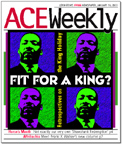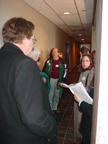Sex and Social Theory
It's telling that Earl Ofari Hutchinson's [Jan. 16] article on Martin Luther King ties the civil rights movement to liberation priests in Latin America, when liberation theology is a heresy. Or that King inspired women's right groups when MLK opposed the fetal killing fields of feminazis.
A champion of nonviolence and freedom, Rev. King harnessed the violence of northern criminal gangs and was slave to his passions. E. Michael Jones says that, "by spreading social disorder, King claimed to be releasing social pressure which might otherwise rupture society's pipes, a theory generally known as "plumbing psychology." King's social theories were based, in other words on his personal morality, according to which King's obsessive womanizing was a way to relieve stress. When a friend raised the subject of"his compulsive sexual athleticism," King answered, "I'm away from home 25 to 27 days a month. F***ing's a form of anxiety reduction." King's politics were based on his psychology, and both fused into an essentially Reichian view about the source of evil in both the soul and the polis. The source of evil, according to the spirit of the times which King imbibedwas repression, specifically "repression of passion."
King's northern desegregation helped WASP social engineers destroy Catholic political power in ethnic neighborhoods and undermine traditional morality and large families. His libidinal athleticism made him ignore the moral problems eroding Negro families weakened by rootless urban life. The civil rights movement was dominated by the Left and its commitment to sexual liberation and the eugenics foundations funding the movement. Thus, when the Johnson administration pinpointed the root of the disintegration of black families, the president's family policy was rejected by the movement's sexual revolutionaries.
Hutchinson will forgive me if the King holiday isn't on the top of my list.
Matthew V. Haltom
Letters Policy: Ace LOVES to publish our mail (250 words or less please); please include name and daytime phone. No photocopies. No bulk mail. First come, first served. We may edit for space and grammar; we will limit frequency; and, on popular issues, we may print one or two letters to represent a segment of public opinion. Private correspondence should be labeled “NOT FOR PUBLICATION.”
Mail: 486 West Second St , Lexington, Ky 40507
e-mail: editor@aceweekly.com
Reality Bites
CBS is apparently backing away from its plans to air a reality version of The Beverly Hillbillies.
Though a formal decision has not been made, the network has not yet formally okayed the project, which has drawn protests from groups representing rural communities.
CBS states that no family has been signed for the show and there's no start date for production.
Last week the Whitesburg, Ky.-based Center for Rural Strategies launched a media campaign to protest and put a stop to the show. It spent about $75,000 on ads in several newspapers, slamming the proposed reality show.
 A Resurrection
A Resurrection
Oxford American, (modestly and usually accurately) subtitled "the southern magazine of good writing" is back. Ace readers are well acquainted with its music edition (and the accompanying sampler CD). After a one-year hiatus, some reorganization, and a new investor/publisher (apparently replacing John Grisham) the January/February edition is on stands now. Controversial photographer and Kentucky native Shelby Lee Adams has work featured in the new issue. And frequent Ace contributor Hal Crowther has an essay on Wendell Berry.
Keep Movin'

As weapons inspections in Iraq continue, MoveOn, an organization which is helping to build electronic advocacy groups, is trying to establish support for a movement to put some pressure on President Bush to stay true to his words of using war as the very last resort. MoveOn is working in conjunction with Congressman Ernie Fletcher to have citizens sign petitions to implore President Bush to let the inspectors do their job. The organization had a meeting with Fletcher about the issue on January 21. More information about the organization and further meetings can be found at www.moveon.org.
Politickin'
If you've ever wondered what goes on in the Kentucky Legislature, and if anything ever actually gets done, now you can see it, warts and all, in Legislature 2000: Behind the Scenes. The documentary airs Monday, January 27 at 9 on KET1. The film follows three bills through the 12-week session, capturing firsthand all the twists and turns along the way.
For the project, filmmaker Nell Cox chose one person for and one person against each bill and then, with a small digital camera, simply followed those legislators on the capitol floor, in public hearings, and during private meetings. To fill in gaps during those times when she was asked to leave "when the going got sensitive," Cox quizzed participants to discover the gist of what happened behind closed doors.
The bills Cox followed for the making of Legislature 2000 relate to early childhood development, industrial farming, and mental health insurance parity. More information about programming is available on the KET website at www.ket.org.
To submit an advocacy/activism activity or event for Quickies, email rkirkland@aceweekly.com, or editor@aceweekly.com.